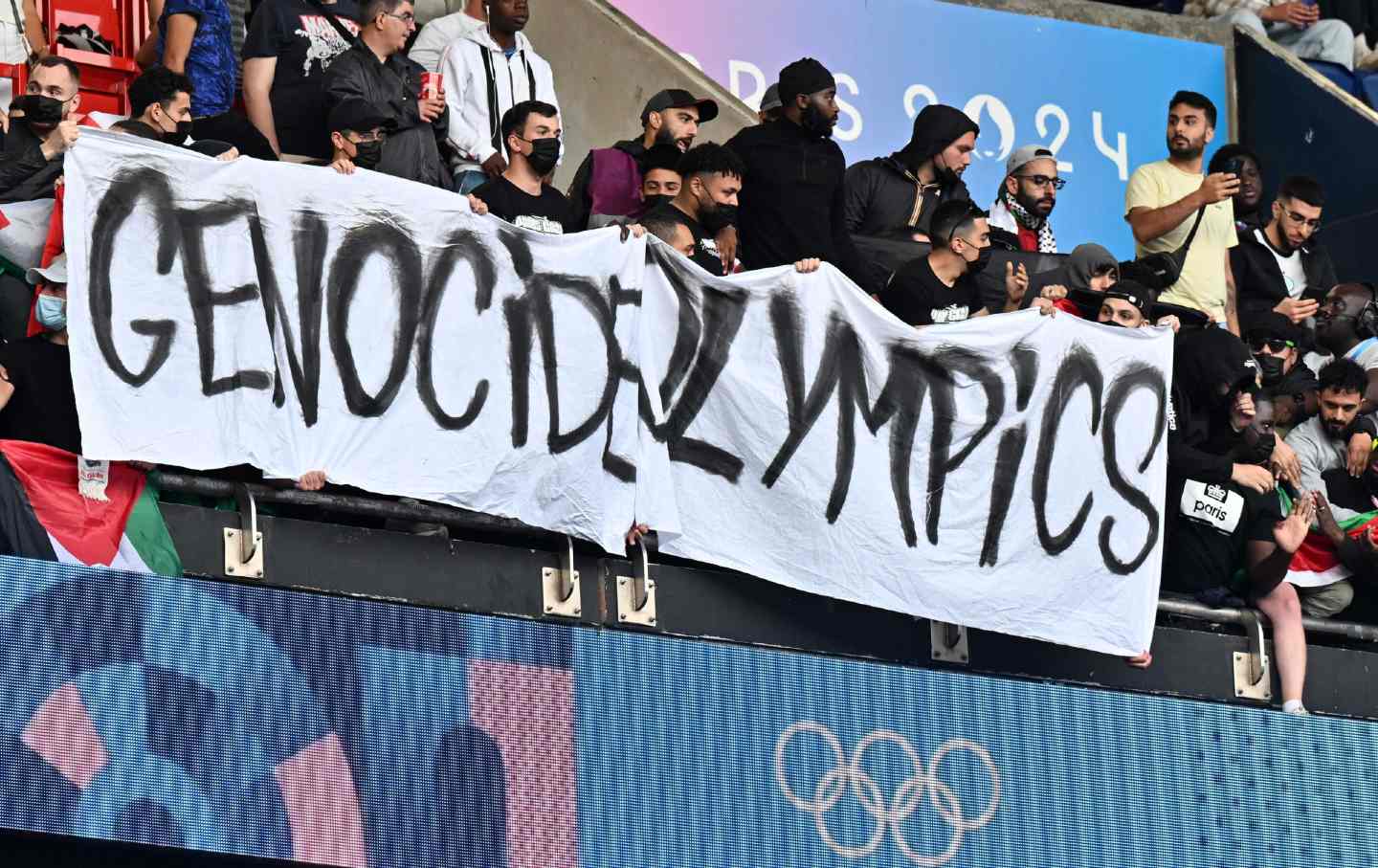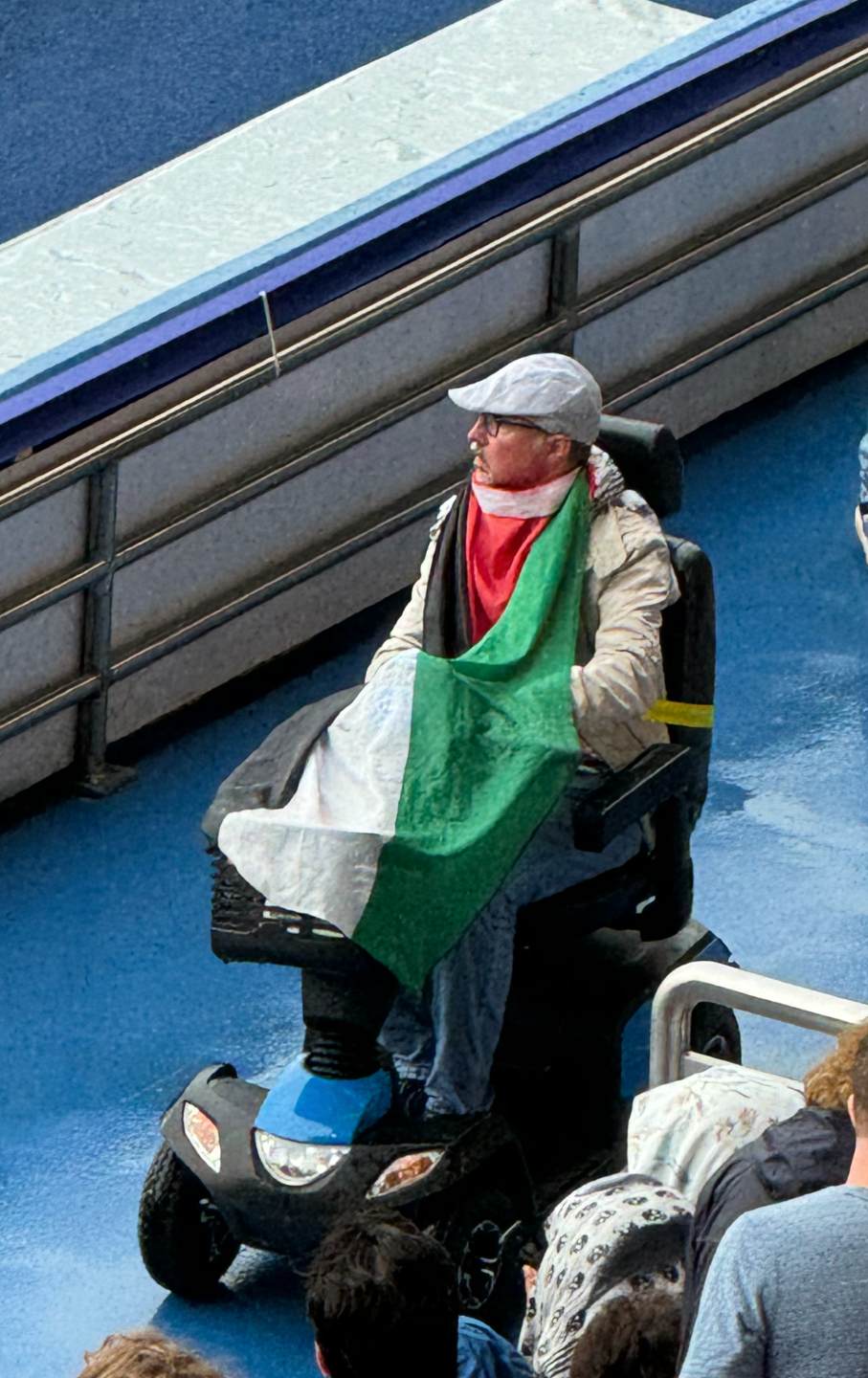Paraguay’s men’s soccer team defeated Israel—but Israel wins just by being allowed to compete.
DAVE ZIRIN and JULES BOYKOFF, THE NATION, JULY 29, 2024

On the same day as the Paris 2024 Summer Olympics opening ceremony, United Nations Secretary General António Guterres issued a video message imploring countries from around the world “to lay down their arms” in the spirit of the Olympic Truce, a UN resolution that emerges with metronomic regularity every two years as the Olympic Games approach. Guterres urged people, “Build bridges. Foster solidarity. And strive for the ultimate goal: peace for all.”
Less than 24 hours later, the Israel Defense Forces unleashed air strikes on a school near Deir al-Balah in central Gaza, killing at least 30 displaced Palestinians seeking shelter, while injuring more than 100.
That very evening in Olympic Paris, with this horrific war crime fresh in mind, the Israeli men’s soccer team took to the pitch to play Paraguay at Parc des Princes Stadium. The atmosphere before the match was tense, and security was on high alert. Paris already looks and feels like a military convention, but the area around the stadium was especially fortified. Security officials, many carrying high-grade weaponry, formed a double perimeter around the stadium, demanding identifications and checking each person twice, once with—as we can attest—a vigorous frisking.
Paraguay won the match 4-2, with two electric goals in stoppage time. But Israel had its own victory just by being there in the first place. It is a tremendous propaganda win for Israel and Prime Minister Benjamin Netanyahu that Israel is competing at these Games at all. Israel’s attacks against the Palestinian people of Gaza has led to calls from human rights advocates to have them sanctioned or banned from sport. Instead the International Olympic Committee has punted responsibility and spewed platitudes. IOC President Thomas Bach said, “We are not in the political business; we are there to accomplish our mission to get the athletes together.”
This timidity is striking, especially since the IOC has sanctioned Russia—forcing the dozen or so athletes participating here in Paris to compete as “individual neutral athletes”—and banned many others for having been trained through the Russian military. How is Israel any different?
Journalist Karim Zidan recently wrote, “Among the 88 Israeli athletes participating in the Paris Olympics, at least 30 have publicly supported the war and the IDF. Some have served as propagandists and spokespeople for the IDF, further emphasizing their status as symbols of Israel’s hard power on the global stage.” It must be noted that every Israeli citizen serves in the IDF, and top athletes, while at times being able to delay service, are not exempt.
The IOC is sanctioning Russia because it commandeered Ukrainian territory that encompassed “regional sports organizations which are under the authority of the National Olympic Committee of Ukraine” and then took over those organizations. Yet Israel has also bombed sports facilities, killed an unconscionable number of athletes and coaches (including Olympic ones), and even converted historic Yarmouk Stadium in Gaza into a makeshift detention camp and interrogation chamber. Gaza’s soccer pitches are unplayable.
Israel’s presence is a prime example of “sportswashing,” which is when political entities use sports and international sporting competitions like the Olympics to cover up crimes. This helps to legitimize, even lionize, human-rights violations.
Sportswashing was on display in their soccer match at Parc des Princes. The packed stadium stood for Israel’s national anthem. A large Israeli flag was held taut by Paris 2024 staff members aside their squad, who could be seen singing along proudly on the big screen. Swaths of fans, including a tightly packed section of supporters toward the corner behind one of the goals, waved Israeli flags with gusto. Chants of “Israel” echoed through the stadium.
This was not accomplished without some visible signs of dissent. Despite the stringent security, a small group of activists inside Parc des Princes flew a massive banner reading “GENOCIDE OLYMPICS.” Others, according to journalist Leyla Hamed, waved Palestinian flags.

In North America, the scandal involving the Canadian women’s national soccer team using drones to surveil their opponents may be getting widespread coverage, but here on the ground in Paris, Israel’s inclusion in the Olympics is commanding more attention. Pro-Palestinian graffiti—“Vive Palestine” and “Free Gaza”—is ubiquitous in the city.
During the Paris 2024 opening ceremony, which we watched in a crowded Parisian bar, the biggest cheer—aside from Céline Dion’s rousing rendition of Edith Piaf’s classic song “L’Hymne à l’Amour”—happened when Palestine’s Olympic athletes appeared on screen floating on a boat down the Seine. The IOC—and the thousands of sportswriters covering the Games—may be largely averting their gaze from the issue of Palestine, but not everyday people in the host city, and certainly not political activists.
At the Israel-Paraguay match, a man in an electric wheelchair roamed along the field level with a Palestinian flag draped across his body. How he was able to get it through security is a mystery. His intent, and the intent of thousands of dissenters throughout Paris, is not.
Dave Zirin
Dave Zirin is the sports editor at The Nation. He is the author of 11 books on the politics of sports. He is also the coproducer and writer of the new documentary Behind the Shield: The Power and Politics of the NFL.
Jules Boykoff
Jules Boykoff is a professor of political science at Pacific University in Oregon and the author of six books on the Olympic Games, most recently What Are the Olympics For?
Thank you for reading The Nation
We hope you enjoyed the story you just read, just one of the many incisive, deeply-reported articles we publish daily. Now more than ever, we need fearless journalism that shifts the needle on important issues, uncovers malfeasance and corruption, and uplifts voices and perspectives that often go unheard in mainstream media.
Throughout this critical election year and a time of media austerity and renewed campus activism and rising labor organizing, independent journalism that gets to the heart of the matter is more critical than ever before. Donate right now and help us hold the powerful accountable, shine a light on issues that would otherwise be swept under the rug, and build a more just and equitable future.
For nearly 160 years, The Nation has stood for truth, justice, and moral clarity. As a reader-supported publication, we are not beholden to the whims of advertisers or a corporate owner. But it does take financial resources to report on stories that may take weeks or months to properly investigate, thoroughly edit and fact-check articles, and get our stories into the hands of readers.
Donate today and stand with us for a better future. Thank you for being a supporter of independent journalism.
Leave a Reply
You must be logged in to post a comment.